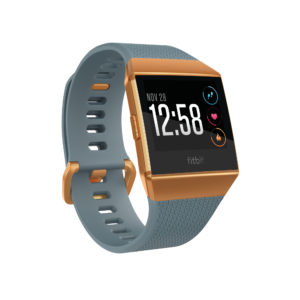 Apple aside, Fitbit may be the most recognizable name in the fitness band business. Then why do its products seem to just barely clear the bar?
Apple aside, Fitbit may be the most recognizable name in the fitness band business. Then why do its products seem to just barely clear the bar?
It’s tough to judge something before we get out hands on it, so we’re willing to give the Fitbit Ionic the benefit of the doubt for now. But its announcement this week did little to make our pulse race. Its major new features — a long-overdue NFC chip and a third-party app capability it acquired when the company bought the remains of Pebble — don’t do much to justify the $300 price when you compare it to its competition.
Even if you love the advertised four-day battery life (and there’s a lot to love about it), the fine print reveals that it drops to 10 hours if you use GPS or the Bluetooth music player. And although you should never take fashion advice from a tech site, the Ionic’s design language borrows from the not-particularly-attractive Blaze.
Fitbit will publish an SDK shortly so maybe developers will add interesting software, but keep in mind that the apps for the Pebble smartwatch weren’t particularly compelling.
As we said, we’re loath to pass final judgement on a product until we actually use it. If we were reviewing the press release, though, we’d think there were better smart bands out there.